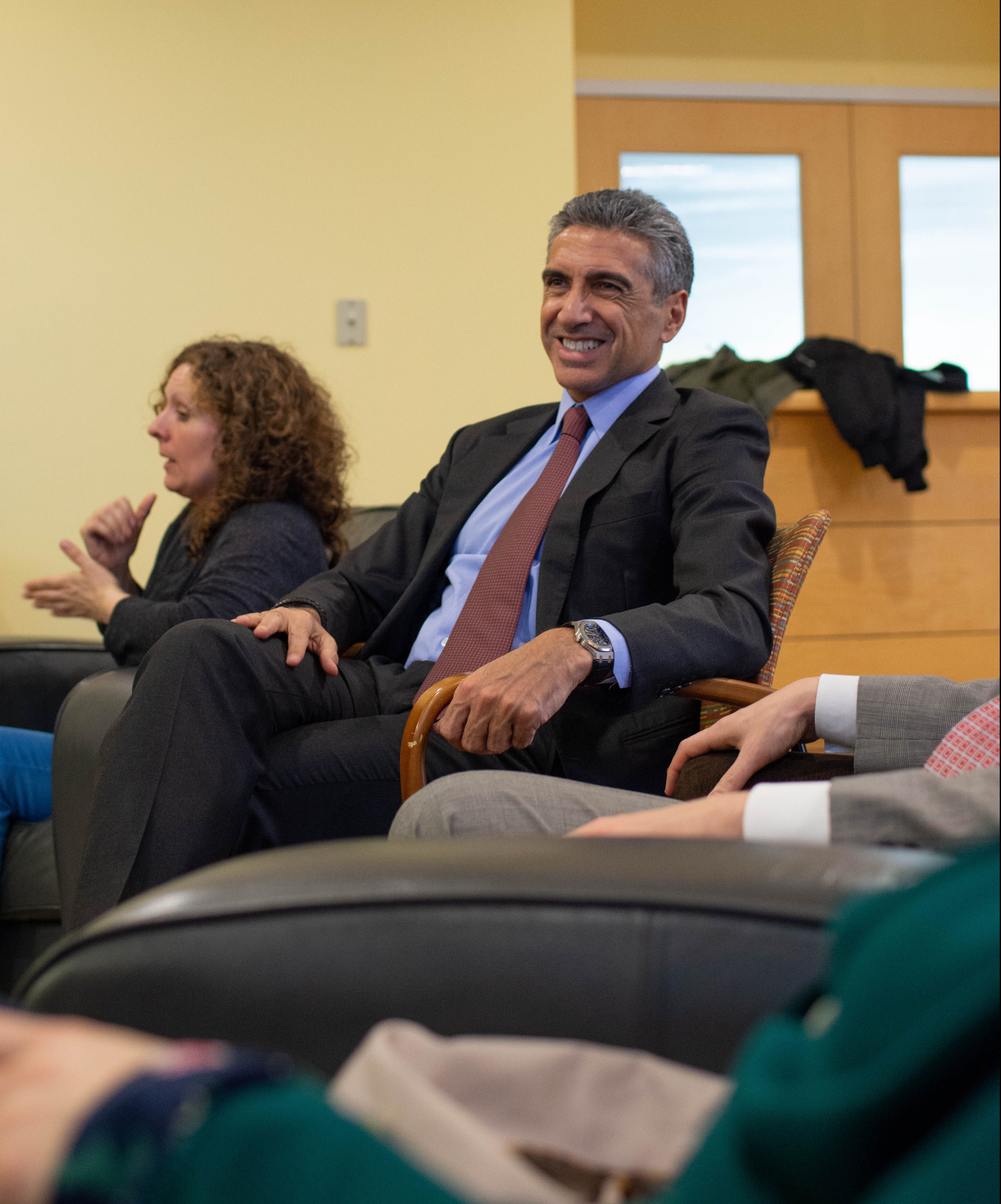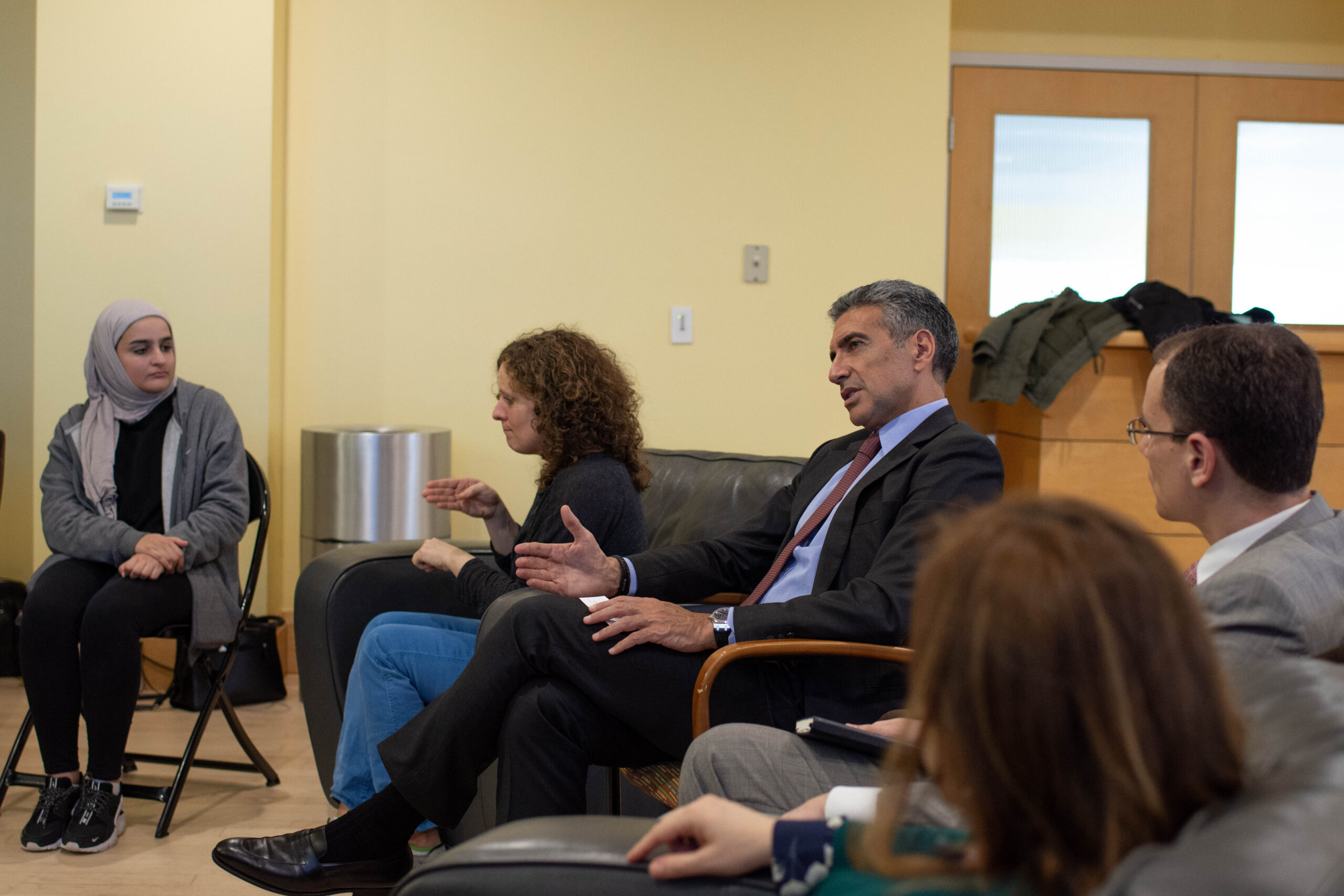Paul Raphael ’83, economics, posed this question to a group of students who gathered in the Fireside Lounge to mingle with the executive vice-chairman of the Swiss bank, UBS.
When Paul Raphael arrived at BWI airport in July 1981—a month and a half before his first semester started—he was fleeing the Lebanese civil war. And although he had arranged with UMBC to arrive early to escape the fighting in his country, he didn’t know what his next step was going to be after getting off the plane. He introduced himself to his seatmate to explain his predicament, and she quickly put his fears to rest. She and her husband were professors at UMBC and would deliver him to the campus on their way home. They ended up waiting with him until he was settled into his dorm room.
Although Raphael doesn’t remember their names, to this day he remembers their hospitality. Their kindness, along with the support of longtime international student advocate Bobbie Shahpazian, who retired as the Associate Director of Scholarships in 2012, shaped the way Raphael thought about his education. “I remember knowing that I couldn’t go back to Lebanon because of the war,” says Raphael to the students circled around him. “I had no choice but to be successful here…and you have more chances if you’re really trying.”
Raphael quickly began planning out the rest of his life’s steps that would ultimately lead him to his position as an executive in the financial industry.
“If I really want to stay in this country I would have to do two or three things,” Raphael remembers thinking early on in his studies. “One, distinguish myself in every possible way, including academically. Two, get a master’s degree, so I am are even further distinguished. And three,” Raphael recounts, “get some work experience. So, together that was kind of my plan.”

Speaking to a predominately international group of students, the investment banker recognizes that the American political situation has changed since he was welcomed to campus three decades ago, but encourages the same work ethic he embraced decades ago: hustle. Learn another language (or two) to make yourself more competitive, take an extra class over summer break, write handwritten thank you notes after every internship, keep an on campus job (or two), connect with your professors outside of class.
Raphael’s plan to distinguish himself led him to successfully graduating in two-and-a-half years, accomplishing an MBA at MIT, and then on to a long career in investment banking. But how did he get to where it all started?
In Lebanon as a high school student, Raphael had limited information about colleges in the United States, but he knew he didn’t want to attend a large campus. From the applications available at an educational resource office connected to the American Embassy in Beirut, Raphael heard about a young college outside of Baltimore. “When I arrived I actually liked UMBC. It was, yes, small but new and nurturing… I didn’t find it as I had feared, you know, really difficult. I have to say, it was a very formative time for me.”
In the roundtable discussion with the students gathered, Raphael turns the questions back on them. Was UMBC your first choice? What is the atmosphere like for international students now? The students respond eagerly and tell Raphael about the dozens of student groups that exist to celebrate different cultural heritages on campus, and that there are now over 1,000 international students studying at UMBC from over 100 counties.
“What I am hearing,” sums up Raphael, “is that once you are here you feel—and it certainly was the case with me—the possibilities are all there to do what you want and to go where you want and to, and that’s not a given elsewhere.”
“I arrived here in 1981, and I feel like I’m a different person now,” Raphael concludes. “So coming back here almost puts me in touch with someone else, someone that’s … buried somewhere inside me. But these are layers, you know, so unless I had the UMBC layer I wouldn’t have the next layer. So this is still very important to me.”
****
Header image courtesy of Raquel Hamner ’20.
Tags: Alumni, Economics, fireside lounge, IES, International Education Services, Spring 2019

